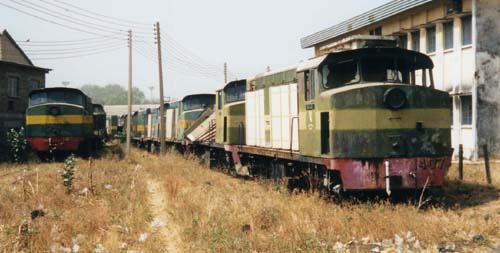|
Our Company History

The introduction of private sector participation by granting concessions
for both freight
and
passenger operations. 7. Key Milestones on the on the Privatisation
Timetable The following are
the key
milestones on the privatisation plan of NRC Appointment of
Transaction Adviser July 2005
Concession Process Begins
August 2005 Enactment of new Railway Act
September 2005 8. Future
Prospects The draft National Transport Policy
awaiting the approval of the
Federal Executive
Council will provide the best possible environment for private sector
participation
and promote
theuse of private sector initiative and investments. In the immediate to
short term, there is
significant
growth potential for both passenger and freight land
transport. The rails, if well
managed, could capture lost grounds
to road transport using NRC’s highly
trained and experienced
workforce from which the concessionaire could
draw. As envisaged in the
25-year railway vision
many new rail lines are being planned the most notable of these
are the
Lagos –Abuja,
Abuja-Kaduna, Abuja-Minna, and the West-East link. The connectivity of
rail services
to major
seaports and international airports, as well as major economic,
commercialand industrial towns
and
cities in the country would facilitate distribution of imported and
export-oriented goods
thereby expanding the
distribution network and culminating intoenhanced
revenue and stabilisation
of the Nigerian economy. Completion
of the Ajaokuta - Warri standard gauge
line would facilitate
transportation of coal to the steel complex at Ajaokuta,
and to transport
the finished products
both for domestic use and to export locations.
Location
NRC’s
corporate Headquarters is located in Lagos at the Yaba / Ebute-
Metta industrial layout,
Ebute- Metta, Lagos. It
has a liaison office in Abuja and seven (7)
divisional headquarters in
Zaria, Bauchi, Enugu, Kafanchan, Ibadan,
Lagos, and Port Harcourt. 3. Type
of BusinessNRC
provides the following services: Passenger Services. These include:
Express
trains for long
distance travel e.g. Lagos-Kano Inter city trains for medium journey
travels e.g. Port Harcourt-
Enugu
Mass Train Trains (MTT) for linking rural and urban areas e.g.
Minna- Kaduna-Minna
Commuters for intra-city movement
Freight Services. These include: Covered
Wagons suitable for
loading dry goods such as cement and general merchandise.
Open Wagons
suitable for loading dry
goods such as cars, billets, etc. Special Wagons, Tank Wagons- for liquid
goods,
and Baggage Vans
suitable for parcels, household items and other courier services SBX/CBX
for animals/general
goods
and farm products Workshop Services. These include: Maintenance of
locos and rolling Stock;
Foundry services -bricks
making & carpentry; and Other commercial
services. Ancillary services.
These include
Medical services;
Advertising Facilities; Printing Press; Catering; and Real estate 4.
Facilities The length of
the Nigerian Railway
network is 3,793 km and consists of narrow gauge
(3,505 km of 1067 mm gauge)
and standard gauge (293km of 1435 mm
gauge). The basic characteristics of
the track are
single-track lines, light and medium weight rail, steel and wooden
sleepers.
The railway carries
both freight and passenger traffic and operates short and light trains.
Three major Workshops
in
Lagos, Enugu, Zaria and; 280 railway stations (180 operational and 100
non-operational) 5.
Employees The
current staff strength at NRC is about 14,000. 6.
Privatisation Plan The National
Council on Privatisation is implementing
a medium term programme for the
reform and privatisation
of NRC that comprises the following steps: The formulation
and
implementation of a new Transport
Policy for Nigeria;The enactment of a new Railway Act creating a new legal
and
regulatory
framework that will take into account both economic and safety regulation;
The restructuring and
corporatisation
of the NRC; Divestiture of non-core NRC assets; The
establishment of an
independent multi-sector regulator for the
Transport sector
 |

MORE
2 main lines (South-West to North-East; South-East to North-West) inter-linked
and terminatory at Lagos, Port Harcourt, Kaura Namoda, Maiduguri and Nguru. Major junctions at Kaduna, Kafanchan, Zaria. Gauge:
1067mm; Total length 3505 route km.
RESOURCES: AGRICULTURAL, MINERAL AND MARINE
Nigeria, in addition to its
huge population is endowed with significant agricultural, mineral, marine and forest resources. Its multiple vegetation zones,
plentiful rain, surface water and underground water resources and moderate climatic extremes, allow for production of diverse
food and cash crops. Over 60 per cent of the population is involved in the production of the food crops such as cassava, maize,
rice, yams, various beans and legumes, soya, sorghum, ginger, onions, tomatoes, melons and vegetable. The main cash crops
are cocoa, cotton, groundnuts, oil palm and rubber. Extractions from these for export and local industrial use include cocoa
flour and butter, rubber crumb, vegetable oil, cotton fibre and yarn. The rain forests have been well exploited for timber
and wood products of exotic and popular species.
Oil and Gas, by value, are the most important minerals. They are exploited
and produced in the Niger Delta basin and off-shore on the continental shelf and in the deep-sea of the territorial waters.
Nevertheless, there are significant non-oil mineral deposits on land many of which have been identified and evaluated: coal,
iron ore, gypsum, kaolin, phosphates, lime -stone, marble, columbine, baryte and gold.
 |

